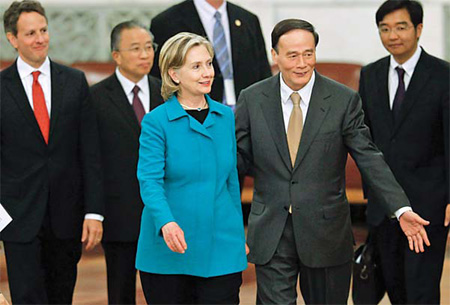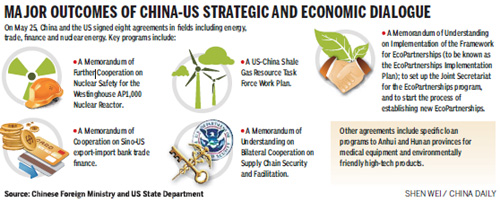News
Greater role to aid bilateral ties urged
By Wu Jiao (China Daily)
Updated: 2010-05-26 07:40
 |
Large Medium Small |
|
 Chinese Vice-Premier Wang Qishan (second from right) and US Secretary of State Hillary Clinton attend a press conference in Beijing on Tuesday, after the two-day China-US Strategic and Economic Dialogue concluded with eight agreements signed between the two countries.[Sheng Jiapeng/China News Service] |
Hu said the two rounds of the dialogues held so far reflected the vitality and vigor of the mechanism, which he and US President Barack Obama initiated in April last year.
With about 50 representatives from more than 40 departments of both countries participating in the dialogue, the two countries discussed a range of strategic, comprehensive and long-term issues, with trade and economic policies as well as regional and energy issues high on the agenda.
Hu called on teams from both sides to seriously implement achievements, draw on their experiences and strengthen the building of the mechanism so that it can play a greater role.
Underlining the importance of the talks between the world's largest and third-largest economies, Washington sent a mammoth 200-strong delegation, including several Cabinet-level ministers, to the Chinese capital.
"The dialogue has been very productive," Clinton said as the talks wound down.
"The two teams worked hard to realize the vision between Obama and you," Clinton told Hu.
She said the two sides had deepened cooperation in the second round of talks with the largest-ever delegation.
"This round of the dialogue did not solve all our problems but did produce concrete results," Clinton said.
The dialogue ended on Tuesday with the two sides signing eight agreements, which include 26 detailed contracts, said Chinese Foreign Minister Yang Jiechi.
Chinese Premier Wen Jiabao on Tuesday also met Clinton and Geithner. He hailed the two-day dialogue as a "success".
"It is better for China and the US to have dialogue rather than engage in confrontation," Wen said.
Wen said the dialogues, which can promote mutual understanding and consensus, had demonstrated that both China and the US were willing to cooperate.
Geithner also said the dialogues demonstrated "remarkably effective commitments" to cooperation between the two countries.
"Because of forceful action between the US and China, and because of our commitment to cooperation, our economies are much stronger. The world is moving towards greater balance," Geithner said.
The US is willing to join China in taking more action to deal with issues such as the international financial crisis and climate change, as well as in maintaining global and regional peace and stability, Geithner said.
The S&ED, one of the existing 60 mechanisms between China and the US, is the highest-level inter-governmental communication platform that aims at issues of strategic and overarching impact. Rather than focusing on just a few detailed topics as some other mechanisms do, the dialogue is more involved in tone-setting and clarifying skepticism.
"We should not have unrealistic expectations of it," said Yuan Peng, head of US studies at the China Institutes of Contemporary International Relations.
He was commenting on a number of US media reports which said that if there is no progress on the currency issue, the dialogue will be a failure and lose its meaning.
"The global landscape is still full of changes and complexity," said Yuan, citing the lingering impact of the financial crisis and the worsening regional situation.
"All these need China and the US to strengthen their communication and exchanges," Yuan said.
The dialogue came at a time when the two countries have doubts about the policies of each other and it "will be conducive for each side to use the platform to clarify their own strategies and stance", Yuan said.
"This is more significant than just settling specific issues," Yuan said.






